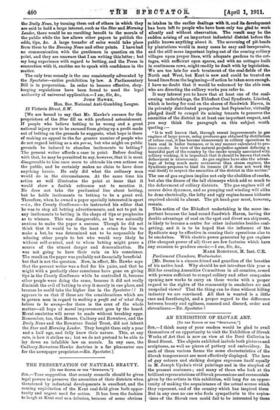THE PRESERVATION OF NATURAL BEAUTY. [To THE EDITOR ON THE
" SyscrApos:1 Sin,—Your suggestion that county councils should be given legal powers to preserve the amenities of their districts when threatened by industrial developments is excellent, and the coining exploitation of the Kent coal-field gives both oppor- tunity and urgent need for action. It has been the fashion to laugh at Kent coal as a delusion, because of some obvious
m istakes in the earlier dealings with it, and its development has been left to people who have been only too glad to work silently and without observation. The remit may be the sudden arising of an important industrial district before the public knows anything about it. The screening of pit-beads by plantations would in many eases be easy and inexpensive, and the still more important laying out of the coming colliery villages upon proper lines, with adequate gardens to the cot- tages, with sufficient open spaces, and with no cottages built in continuous rows, might readily be dealt with by legislation. We are too late for such treatment of the coal-fields of the North and West, but Kent is new and could be treated on broad lines from the beginning—if action be taken soon enough. I have no doubt that it would be welcomed by the able men who are directing the colliery works you refer to.
It may interest you to know that at least one of the coal- owning undertakings, the Ebbsfleet Coal Syndicate, Limited, which is boring for coal on the shores of Sandwich Haven, in its privately distributed prospectus last September, virtually pledged itself to compel its mining tenants to preserve the amenities of the district in at least one important respect, and you may think the paragraph on this subject worth quoting
it is well known that, through recent improvements in gas engines of large power, using producer-gas obtained by distillation of refuse coal, it has become unnecessary in colliery operations to burn coal in boiler furnaces, or in any manner calculated to pro- duce smoke. In view of the natural prejudice against defacing a beautiful part of the country by the smoke usually associated with colliery working, it is important that it should be known that such defacement is unnecessary. As gas engines have also the advan- tage of being much more economical than steam engines, the Syndicate proposes to bind its tenants (if it does not work the coal itself) to respect the amenities of the district in this matter."
The use of gas engines implies not only the abolition of smoke,
but also the disuse of the tall chimneys which add so much to the defacement of colliery districts. The gas engines will of course drive dynamos, and as pumping and winding will alike
be done electrically, the lofty and ugly engine-houses hitherto required should be absent. The pit bead-gear must, however., remain.
This action of the Ebbsfleet undertaking is the more im- portant because the land round Sandwich Haven, having the' double advantage of coal on the spot and direct sea shipment, is likely to become a centre for other industries besides coal-
getting, and it is to be hoped that the influence of the Syndicate may be effective in causing their operations also to be smokeless. With electric power generated by gas engines (the cheapest power of all) there are few factories which have
any occasion to produce smoke.—I am, Sir, &c.,
[Mr. Burns is a sincere friend and guardian of the beauties of his native land. Why should he not introduce this year a Bill for creating Amenities Committees in all counties, armed with powers sufficient to compel colliery and other companies opening new works to carry on these works with a proper regard to the rights of the community in smokeless air and unspoiled views? That the thing can be done without killing industry we are convinced. All that is wanted is a little care and forethought, and a proper regard to the difference between beauty and ugliness, concord and discord, order and slovenliness.—En. Spectator.1










































 Previous page
Previous page